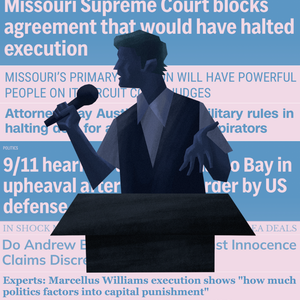
A new study conducted by law professors Justin Marceau (left) and Sam Kamin (middle) of the University of Denver and Wanda Foglia (right) of Rowan University found that the death penalty in Colorado is applied so rarely as to render the system unconstitutional. The authors concluded that Colorado’s death penalty law is applicable to almost all first-degree murders, but is imposed so infrequently that it fails to provide the kind of careful narrowing of cases required by the Supreme Court in Furman v. Georgia (1972). In this groundbreaking study, the researchers reviewed all first-degree murder cases in the state between 1999 and 2010. They found that 92 percent of the 544 first-degree murder cases in that time span contained at least one aggravating factor that made the defendant eligible for the death penalty. However, prosecutors filed notices of intent to seek the death penalty in only 15 murder cases and pursued the death penalty at trial in only five of those cases — a 1% rate among death-eligible cases. The authors wrote, “Under the Colorado capital sentencing system, many defendants are eligible but almost none are actually sentenced to death. Because Colorado’s aggravating factors so rarely result in actual death sentences, their use in any given case is a violation of the Eighth Amendment.”
Colorado reinstated the death penalty in 1975. Since that time, the state has had one execution and currently has three people on death row.
(J. Ingold, “Colorado death penalty law unconstitutional, study contends,” Denver Post, August 6, 2012; see authors’ submission to the court in State v. Montour, No. 02CR782, July 11, 2012). See Arbitrariness and Studies. Listen to our podcast on Arbitrariness.
Arbitrariness
Nov 05, 2024

DPI Report Provides Valuable Context for 2024 Elections
Arbitrariness
Oct 04, 2024

